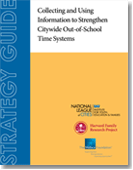The Harvard Family Research Project separated from the Harvard Graduate School of Education to become the Global Family Research Project as of January 1, 2017. It is no longer affiliated with Harvard University.

|
August 2011 Strategy Guide: Collecting and Using Information to Strengthen Citywide Out-of-School Time SystemsLane Russell, Priscilla Little |
Article Information
- Full Text (HTML)
- Full Text (PDF: 412 kb)
Cities around the country are building systems that seek to make the most of public and private resources to provide widespread, high-quality, out-of-school time (OST) opportunities. Local officials are leading these efforts because participation in OST programs not only benefits young people, but also the cities in which they live, with the potential to support many city priorities—from reducing crime to creating a more skilled workforce. This guide, co-authored by the National League of Cities and Harvard Family Research Project, provides municipal leaders and their key partners with strategies for collecting and using information to strengthen citywide OST systems.
Reliable data enable city leaders to measure the scope and impact of local OST programs across their communities and to promote continuous improvement within these programs. For instance, geographic information system (GIS) data can help municipal officials determine whether programs are reaching youth in disadvantaged neighborhoods, while surveys, focus groups, and attendance information can reveal if programs fit the interests and needs of youth and their parents.
The six strategies presented in this guide are intended to help build the capacity of communities to get and use information across a citywide system:
- Collect attendance and participation information to support access, enrollment, and quality improvements.
- Conduct market research to assess family, youth, and community needs.
- Use geographic information system (GIS) technology to identify service gaps and improve access.
- Develop, adapt, and implement a citywide program quality assessment tool.
- Conduct and support program and city-level evaluation efforts.
- Develop common, system-wide outcome measures/indicators.
The guide presents examples of how mayors, councilmembers, and other municipal leaders across the country have implemented each strategy. Their efforts highlight the powerful role city leaders can play in supporting data collection at the program and city levels to improve the OST opportunities available in their cities and towns.
